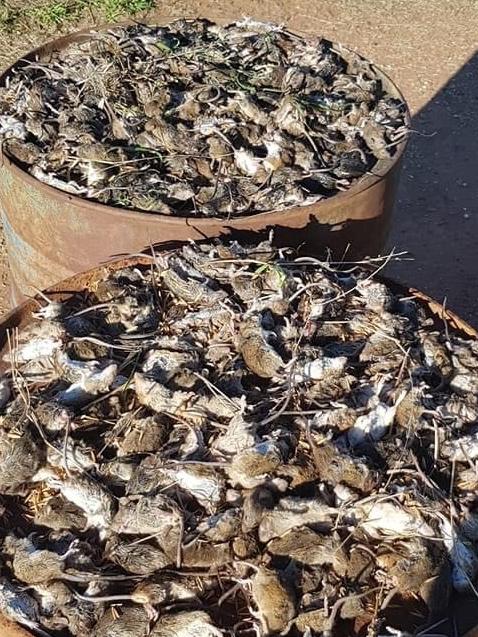NSW mouse plague sees Dunedoo man catch deadly bacterial infection
A hotel owner thought he might have Covid when he started to feel unwell, but he was suffering from an infection caused by the mouse plague.
NSW
Don't miss out on the headlines from NSW. Followed categories will be added to My News.
The mouse plague is not just causing havoc on NSW crops and property, the rodents almost cost Dunedoo man Trevor Hardie his life.
Mr Hardie, 70, suffered acute kidney failure, liver failure and a leaky heart valve after catching leptospirosis, a bacterial disease carried by mice, which could have killed him within days.
The hotel owner started feeling unwell in late April but by the following week he was in hospital fighting for his life after catching the infection which can be found in mouse urine.



“I was feeling pretty crook, I thought I had the flu, then Covid … by Saturday, we had the doctor out, and then I ended up in an ambulance headed to Wollongong Hospital,” Mr Hardie said.
“I couldn’t walk, I’d sweat all night, my kidneys and liver packed it in … it was the sickest I’d ever felt in my life, I wouldn’t wish it on anybody.”
Spread to humans from animals like mice and rats, leptospirosis can be caught through contact with infected animal urine or contaminated soil or water, according to NSW Health.
There has been a 700 per cent increase in leptospirosis in NSW this year, with 42 lab-confirmed cases of the disease since the start of 2021 compared to just six last year.
Mr Hardie was also diagnosed with Q virus, another bacterial infection causing fever and flu-like symptoms, and spent five nights in hospital.
He has been recovering at home ever since as his symptoms slowly improve, but issued a stark warning to country residents trying their best to fend off the mice.
“Everybody’s doing their bit and battling hard in the bush, we’re making sure houses and shops are clean, our guests are OK, but people need to be careful,” Mr Hardie said.
“All it takes is to have (mice) scurrying around in a shed, grain silo, or a home, they pee everywhere and you touch it somehow … it knocked me off my feet for weeks.”
Infectious diseases expert Professor Peter Collignon said rural residents had a naturally higher risk due to living and working around animals, but said the plague “greatly increased” their exposure to leptospirosis.
Prof Collignon warned people in mice-riddled areas to be careful, but offered a few simple steps to help protect against catching the infection.
“An extra disadvantage of having a mouse plague is the potential spread of illnesses like leptospirosis carried by rodents,’’ Prof Collignon said. “Washing hands regularly and wearing some form of protective shield like a mask decreases the chance of infected rodent urine getting into the eyes, nose or the body.”



